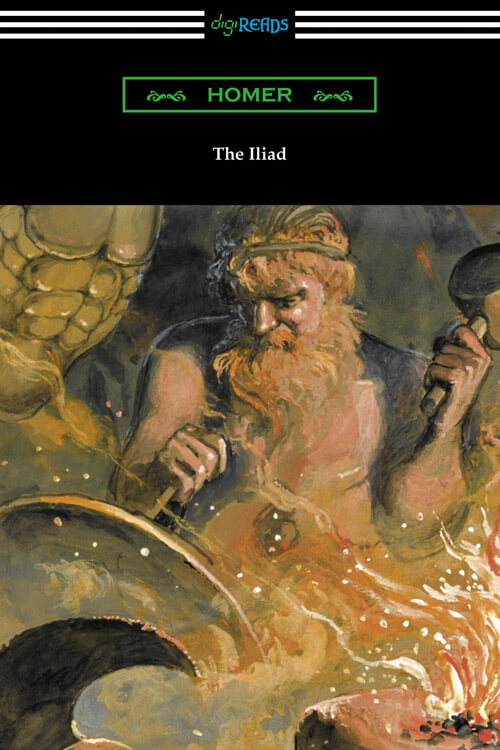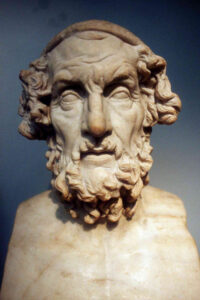
The Iliad of Homer
The Iliad (Ancient Greek: Ἰλιάς, romanized: Iliás, Attic Greek “a poem about Ilium (Troy)”) is one of two major ancient Greek epic poems attributed to Homer. It is one of the oldest extant works of literature that is still widely read by modern audiences. As with the Odyssey, the poem is divided into 24 books and was written in dactylic hexameter. It contains 15,693 lines in its most widely accepted version. Set towards the end of the Trojan War, a ten-year siege of Troy by a coalition of Mycenaean Greek states, the poem depicts significant events in the siege’s final weeks. In particular, it describes a fierce quarrel between King Agamemnon and a celebrated warrior, Achilles. It is a central part of the Epic Cycle. The Iliad is often regarded as the first substantial piece of European literature. The Iliad and the Odyssey were likely written down in Homeric Greek, a literary mixture of Ionic Greek and other dialects, probably around the late 8th or early 7th century BC.
Homer’s authorship was infrequently questioned in antiquity. Still, contemporary scholarship predominantly assumes that the Iliad and the Odyssey were composed independently and that the stories formed as part of a long oral tradition. The poem was performed by professional reciters of Homer known as rhapsodes. Critical themes in the poem include glory, pride, fate, and wrath. Despite being predominantly known for its severe and tragic themes, the poem also contains comedy and laughter. The poem is frequently described as a masculine or heroic epic, especially compared with the Odyssey. It contains detailed descriptions of ancient war instruments, battle tactics, and fewer female characters. The Olympian gods also play a significant role in the poem, aiding their favoured warriors on the battlefield and intervening in personal disputes. Their characterization in the poem humanized them for Ancient Greek audiences, giving a concrete sense of their cultural and religious tradition. Regarding formal style, scholars often explore the poem’s repetitions and use of similes and epithets.
Read or download Book
Homer
Homer was a Greek poet who is credited with writing the Iliad and the Odyssey, two epic poems that are foundational works of ancient Greek literature.
Biography
Homer is considered one of the most revered and influential authors in history. Homer’s Iliad centres on a quarrel between King Agamemnon and the warrior Achilles during the last year of the Trojan War. The Odyssey chronicles the ten-year journey of Odysseus, king of Ithaca, back to his home after the fall of Troy. The poems are in Homeric Greek, also known as Epic Greek, a literary language that shows a mixture of features of the Ionic and Aeolic dialects from different centuries; the predominant influence is Eastern Ionic. Most researchers believe that the poems were originally transmitted orally. Despite being predominantly known for its severe and tragic themes, the Homeric poems also contain instances of comedy and laughter. Homer’s epic poems shaped aspects of ancient Greek culture and education, fostering ideals of heroism, glory, and honour.
To Plato, Homer was simply the one who “has taught Greece” (τὴν Ἑλλάδα πεπαίδευκεν, tēn Helláda pepaídeuken). In Dante Alighieri’s Divine Comedy, Virgil refers to Homer as “Poet sovereign”, king of all poets; in the preface to his translation of the Iliad, Alexander Pope acknowledges that Homer has always been considered the “greatest of poets”. From antiquity to today, Homeric epics have inspired many famous literature, music, art, and film works. The question of by whom, when, where, and under what circumstances the Iliad and Odyssey were composed continues to be debated. Scholars remain divided as to whether the two works are the product of a single author. The poems were thought to be composed around the late eighth or early seventh century BC. Many accounts of Homer’s life circulated in classical antiquity; the most widespread was that he was a blind bard from Ionia, a region of central coastal Anatolia in present-day Turkey. Modern scholars consider these accounts legendary.






